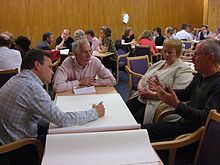월드 카페

월드 카페(world café)는 카페처럼 여러 개의 작은 테이블에서 여러 사람들이 주제에 대해 토론하는 지식 공유를 위한 구조화된 대화 과정이다. 모든 사람이 발언할 기회를 얻을 수 있도록 어느 정도 형식이 유지될 수 있다.[1] 미리 정의된 질문은 처음부터 합의가 되었지만 결과나 해결책이 미리 결정되는 것은 아니다.[2][3] 집단적 토론이 사람들의 개념을 바꾸고 집단적 행동을 장려할 수 있다고 가정한다.[4] 이벤트에는 최소 12명의 참가자가 필요하지만 상한은 없다.[5] 예를 들어, 2011년 이스라엘에서는 당시 열린 일련의 사회 정의 시위의 일환으로 여러 도시에서 하루에 "1000 Tables"라는 행사가 열렸으며 약 천 명이 참여했다.[6]
같이 보기[편집]
각주[편집]
- ↑ Elliott, Janice; Heesterbeek, Sara; Lukensmeyer, Carolyn J.; Slocum, Nikki (2005). Steyaert, Stef; Lisoir, Hervé, 편집. 《Participatory methods toolkit: a practitioner's manual》. [Brussels]: King Baudouin Foundation / Flemish Institute for Science and Technology Assessment. 185ff쪽. ISBN 978-90-5130-506-7.[깨진 링크(과거 내용 찾기)]
- ↑ Bache, Christopher M. (2008년 8월 28일). 《The Living Classroom: Teaching and Collective Consciousness》. SUNY Press. ISBN 978-0-7914-7646-8.
- ↑ Liteman, Merianne; Campbell, Sheila; Liteman, Jeffrey (2006년 7월 14일). 《Retreats That Work: Everything You Need to Know About Planning and Leading Great Offsites》. John Wiley & Sons. 48–쪽. ISBN 978-0-7879-8643-8.
- ↑ Lewis, Sarah (2011년 3월 16일). 《Positive Psychology at Work: How Positive Leadership and Appreciative Inquiry Create Inspiring Organizations》. John Wiley & Sons. ISBN 978-1-119-99621-7.
- ↑ Dickson, Graham; Bill Tholl (2014년 1월 13일). 《Bringing Leadership to Life in Health: LEADS in a Caring Environment: A New Perspective》. Springer Science & Business Media. 146–쪽. ISBN 978-1-4471-4875-3.
- ↑ Hartman, Ben (2011년 9월 10일). “Round table discussions held in cities across Israel”. 《The Jerusalem Post》.
외부 링크[편집]
- The World Café website
- The World Café Community website (by subscription)
